模块2 Unit 3 Amazing people Grammar and usage(1)_ Past perfect tense课件(24张)
文档属性
| 名称 | 模块2 Unit 3 Amazing people Grammar and usage(1)_ Past perfect tense课件(24张) | 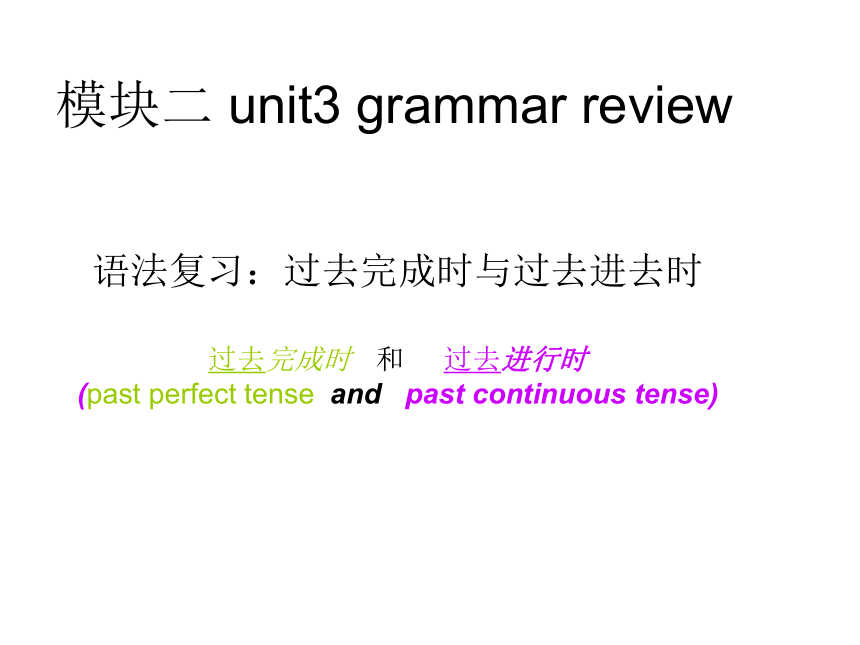 | |
| 格式 | zip | ||
| 文件大小 | 5.2MB | ||
| 资源类型 | 教案 | ||
| 版本资源 | 牛津译林版 | ||
| 科目 | 英语 | ||
| 更新时间 | 2019-07-22 22:03:37 | ||
图片预览

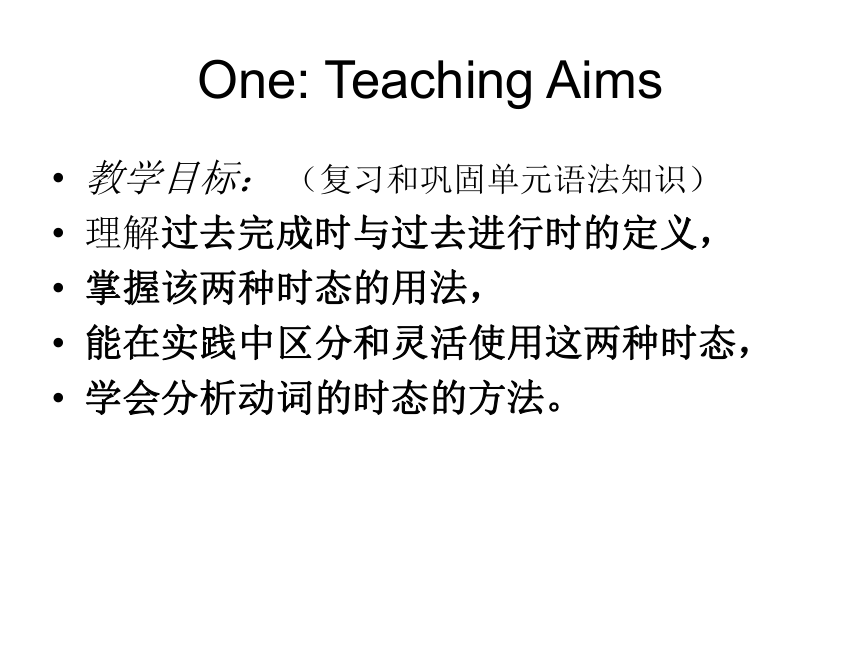
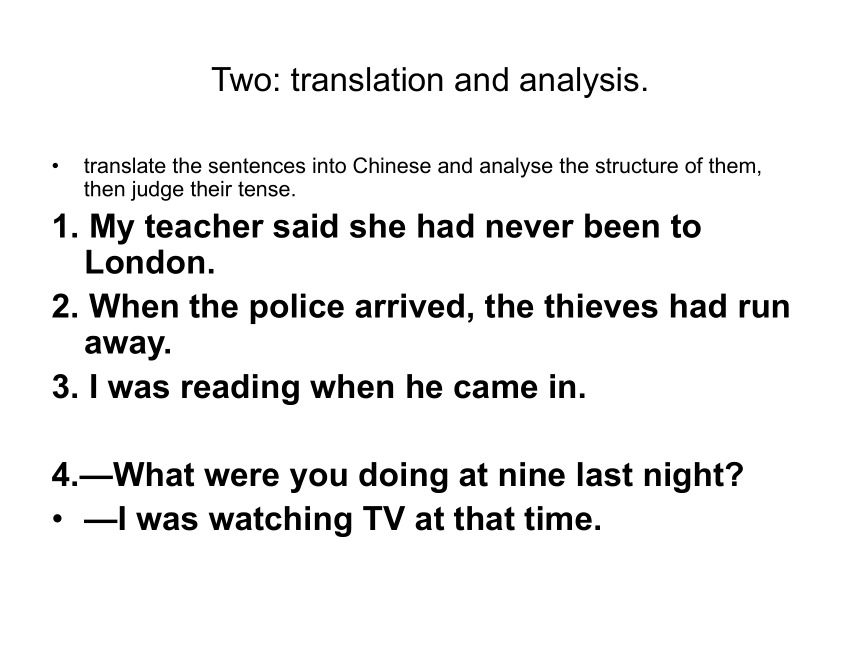
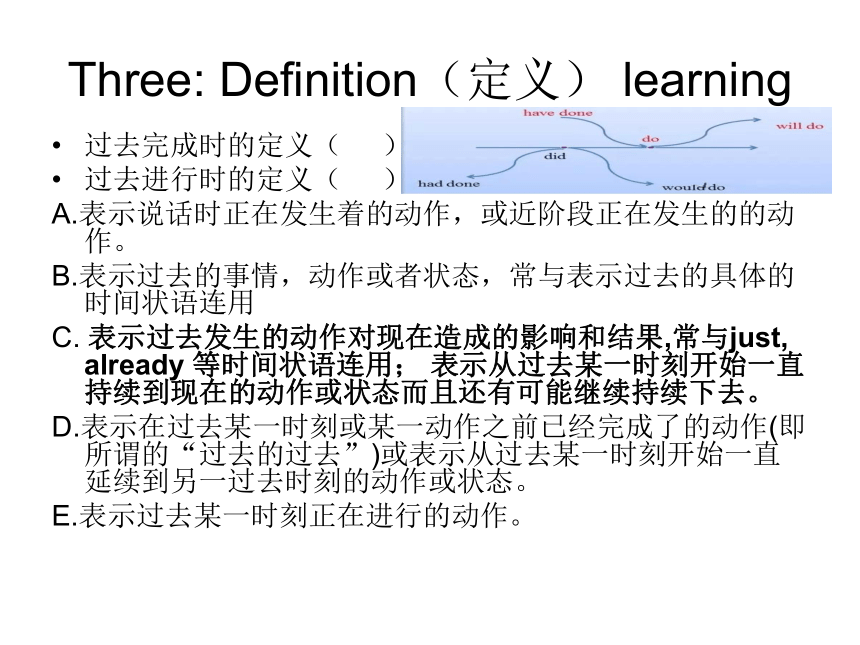
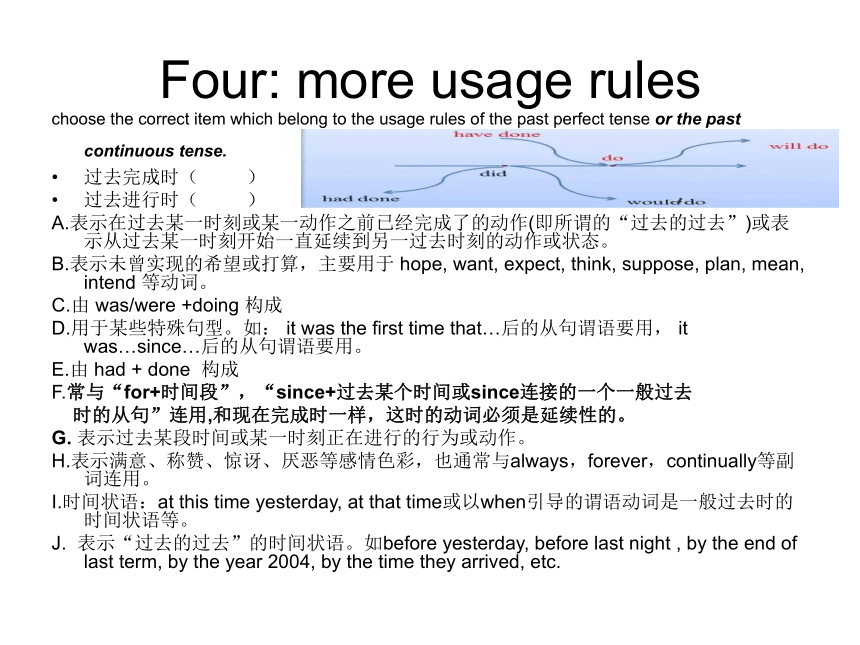
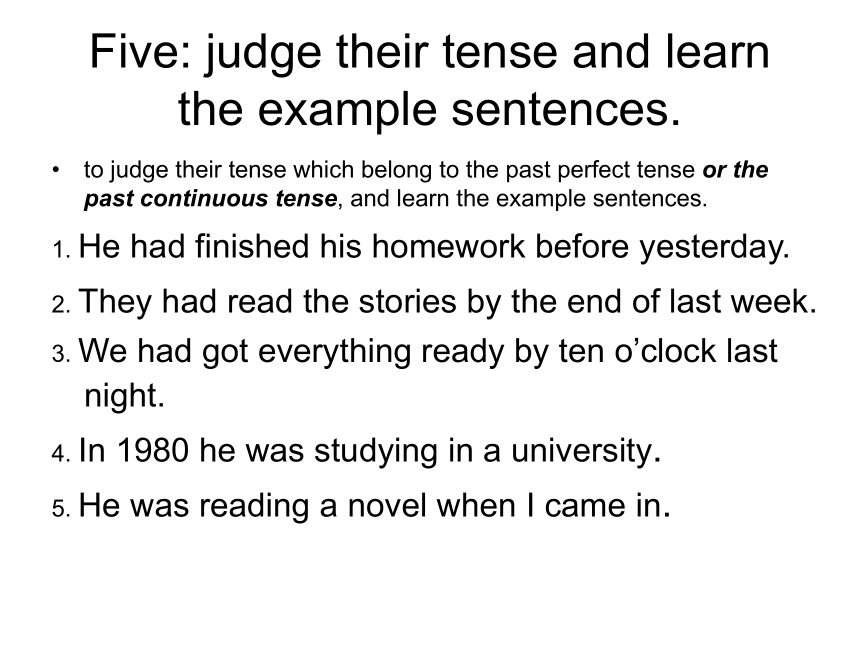
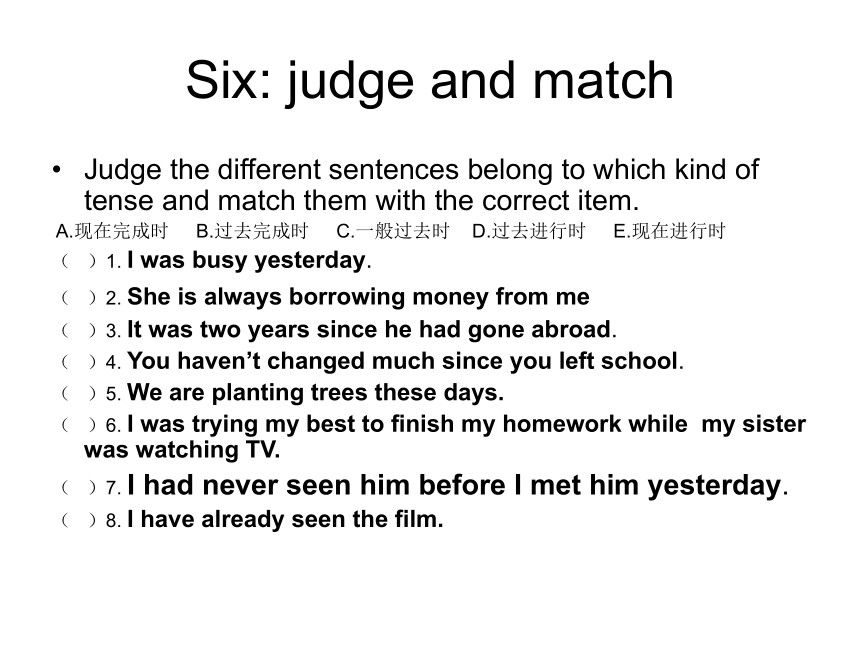
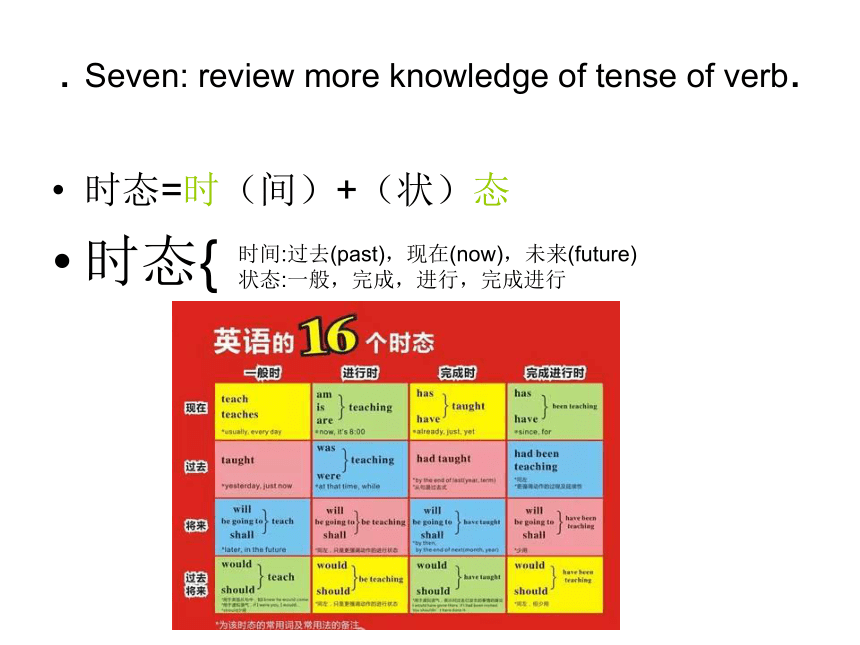
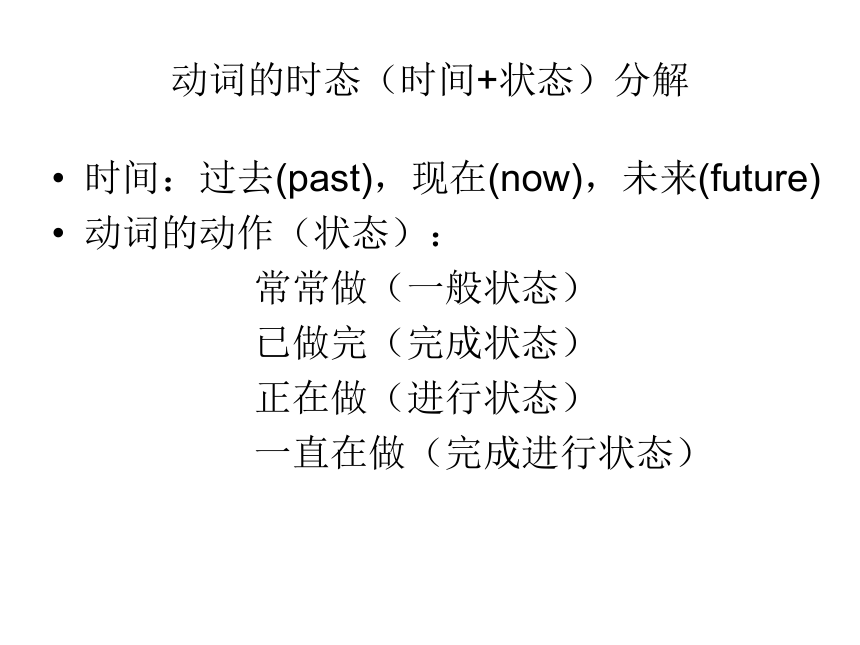
文档简介
课件24张PPT。模块二 unit3 grammar review语法复习:过去完成时与过去进去时
过去完成时 和 过去进行时 (past perfect tense and past continuous tense)
One: Teaching Aims教学目标: (复习和巩固单元语法知识)
理解过去完成时与过去进行时的定义,
掌握该两种时态的用法,
能在实践中区分和灵活使用这两种时态,
学会分析动词的时态的方法。 Two: translation and analysis.translate the sentences into Chinese and analyse the structure of them, then judge their tense.
1. My teacher said she had never been to London.
2. When the police arrived, the thieves had run away.
3. I was reading when he came in.
4.—What were you doing at nine last night?
—I was watching TV at that time.Three: Definition(定义) learning 过去完成时的定义( )
过去进行时的定义( )
A.表示说话时正在发生着的动作,或近阶段正在发生的的动作。
B.表示过去的事情,动作或者状态,常与表示过去的具体的时间状语连用
C. 表示过去发生的动作对现在造成的影响和结果,常与just, already 等时间状语连用; 表示从过去某一时刻开始一直持续到现在的动作或状态而且还有可能继续持续下去。
D.表示在过去某一时刻或某一动作之前已经完成了的动作(即所谓的“过去的过去”)或表示从过去某一时刻开始一直延续到另一过去时刻的动作或状态。
E.表示过去某一时刻正在进行的动作。Four: more usage ruleschoose the correct item which belong to the usage rules of the past perfect tense or the past continuous tense.
过去完成时( )
过去进行时( )
A.表示在过去某一时刻或某一动作之前已经完成了的动作(即所谓的“过去的过去”)或表示从过去某一时刻开始一直延续到另一过去时刻的动作或状态。
B.表示未曾实现的希望或打算,主要用于 hope, want, expect, think, suppose, plan, mean, intend 等动词。
C.由 was/were +doing 构成
D.用于某些特殊句型。如: it was the first time that…后的从句谓语要用, it was…since…后的从句谓语要用。
E.由 had + done 构成
F.常与“for+时间段”,“since+过去某个时间或since连接的一个一般过去
时的从句”连用,和现在完成时一样,这时的动词必须是延续性的。
G. 表示过去某段时间或某一时刻正在进行的行为或动作。
H.表示满意、称赞、惊讶、厌恶等感彩,也通常与always,forever,continually等副词连用。
I.时间状语:at?this?time?yesterday,?at?that?time或以when引导的谓语动词是一般过去时的时间状语等。
J.??表示“过去的过去”的时间状语。如before yesterday, before last night , by the end of last term, by the year 2004, by the time they arrived, etc. Five: judge their tense and learn the example sentences. to judge their tense which belong to the past perfect tense or the past continuous tense, and learn the example sentences.
1. He had finished his?homework before yesterday.
2. They had read the stories by the end of last week.
3. We had got everything ready by ten o’clock last night.
4. In?1980?he?was?studying?in?a?university.?
5. He?was?reading?a?novel?when?I?came?in.
Six: judge and matchJudge the different sentences belong to which kind of tense and match them with the correct item.
A.现在完成时 B.过去完成时 C.一般过去时 D.过去进行时 E.现在进行时
( )1. I was busy yesterday.
( )2. She is always borrowing money from me
( )3. It was two years since he had gone abroad.
( )4. You haven’t changed much since you left school.
( )5. We are planting trees these days.
( )6. I was trying my best to finish my homework while my sister was watching TV.
( )7. I had never seen him before I met him yesterday.
( )8. I have already seen the film. . Seven: review more knowledge of tense of verb.
时态=时(间)+(状)态
时态{
时间:过去(past),现在(now),未来(future)
状态:一般,完成,进行,完成进行动词的时态(时间+状态)分解时间:过去(past),现在(now),未来(future)
动词的动作(状态):
常常做(一般状态)
已做完(完成状态)
正在做(进行状态)
一直在做(完成进行状态)所以,我们可以知道,任何时态,其实都是用动词的不同结构来表达该动作发生的时间和状态特点。
那么,反过来也可以这样说,我们可以通过分析,确定句子中的动作发生的时间和动作发生时的状态,从而确定选择什么动词时态。
我给大家总结出来的这种分析方法,是本课的重点,每个同学都要理解和掌握这种方法,这是一种好的“钓鱼”方法,而不是简单的一条“鱼”而已。那么,用上面的方法,我们可以把过去完成时与过去进行时 这样分析,
过去完成时: 时间---过去;状态---已经完成
过去进行时:时间---过去;状态---正在进行中
我们可以再以下面四个例子来验证和理解上面的分析方法例题1. .After I had done my homework, I went to bed.
例题2. He knew the city very well, because he had lived there before.
例题3. We were having supper when the phone rang.?
例题4. She was writing a letter to her friend last night. Eight: practices.1.请根据下面已经给出的图片或时间提示,选择正确的时态完成句子。
1.When I reached the lake, Tom (已经抓了3条鱼) 。
2.Yesterday I saw Mike (在跟狮子玩耍) 。
3. Liming told me his bike (break).
4.When I reached the airport,the plane (正在起飞) .
5.I knew he (train) the birds for 3 years.2. 10个过去完成时或过去进行时的选择题。
1.The twins, who their homework, were allowed to play badminton on the playground.
A. will finish B. finish
C. have finished D. had finished
2. I found the lecture hard to follow because it _______ when I arrived.
A. started B. was starting
C. would start D. had started
3. —Peter , where did you guys go for the summer vacation?
—We________ busy with our work for months, so we went to the beach to relax ourselves.
A. were B. have been
C. had been D. will be
4. Writing out all the invitations by hand was more time-consuming than we______.
A. will expect B. are expecting
C. expect D. had expected
5. -----We didn’t find Smith attending the lecture.
------No one _____ him about ______ a lecture the following day.
A. told; there to be
B. had told; there to be
C. told; there was
D. had told; there being6. During his stay in Xi’an, Jerry tried almost all the local foods his friends ________,
A. would recommend
B. had recommended
C. have recommended
D. were recommending
7. Sofia looked around at all the faces: she had the impression that she _____ most of the guests before.
A. has seen B. had seen
C. saw D. would see8. She ______ someone, so I nodded to her and went away.
A. phoned B. had phoned
C. was phoning D. has phoned
9. I called Hannah many times yesterday evening, but I couldn't get through. Her brother ______ on the phone all the time.
A. has been talking B. was talking
C. has talked D. talked
10. James has just arrived, but I didn’t know he ___until yesterday.
A. will come B. was coming
C. had come D. came3.过去完成时或过去进行时的填空题
1. By six o’clock he (work) twelve hours.?
2. When we arrived he already (leave).?
3. I ______ (write) a letter at ten last night.
4. Mary?????? (make)a dress when she cut her finger. 4. 历年会考或高考典型题。1.I had done my homework before I went to the cinema yesterday.(2013年.湖南)
2.---Were you surprised by the ending of the film?
----No, I had read the book, so I already knew the story.(2010年.湖南)
3.I was just going to cut my rose bushes but someone had done it, was it you?(2010年.湖南)
4. He said they were leaving for Beijing this afternoon.? (2011年.北京)Nine: summary.(关于过去完成时或过去进行时的概念,结构,常用时间状语和例句以及时态分析方法等。)过去完成时: 时间---过去;状态---已经完成
过去进行时:时间---过去;状态---正在进行中
表示在过去某一时刻或某一动作之前已经完成了的动作(即所谓的“过去的过去”)或表示从过去某一时刻开始一直延续到另一过去时刻的动作或状态。
表示过去某一时刻正在进行的动作。
由 had + done 构成
由 was/were +doing 构成
常与“for+时间段”,“since+过去某个时间或since连接的一个一般过去 时的从句”连用。表示“过去的过去”的时间状语。如before yesterday, before last night , by the end of last term, by the year 2004, by the time they arrived, etc.
时间状语:at?this?time?yesterday,?at?that?time或以when引导的谓语动词是一般过去时的时间状语等。动词的时态(时间+状态)分解
时间:过去(past),现在(now),未来(future)
动词的动作(状态):
常常做(一般状态)
以做完(完成状态)
正在做(进行状态)
一直在做(完成进行状态)
Ten:homework 思考比较:
过去完成时和现在完成时的异同,
过去完成时和过去完成进行时的异同,
现在进行时和过去进行时的异同,
过去进行时和一般过去时的异同。
Think you
过去完成时 和 过去进行时 (past perfect tense and past continuous tense)
One: Teaching Aims教学目标: (复习和巩固单元语法知识)
理解过去完成时与过去进行时的定义,
掌握该两种时态的用法,
能在实践中区分和灵活使用这两种时态,
学会分析动词的时态的方法。 Two: translation and analysis.translate the sentences into Chinese and analyse the structure of them, then judge their tense.
1. My teacher said she had never been to London.
2. When the police arrived, the thieves had run away.
3. I was reading when he came in.
4.—What were you doing at nine last night?
—I was watching TV at that time.Three: Definition(定义) learning 过去完成时的定义( )
过去进行时的定义( )
A.表示说话时正在发生着的动作,或近阶段正在发生的的动作。
B.表示过去的事情,动作或者状态,常与表示过去的具体的时间状语连用
C. 表示过去发生的动作对现在造成的影响和结果,常与just, already 等时间状语连用; 表示从过去某一时刻开始一直持续到现在的动作或状态而且还有可能继续持续下去。
D.表示在过去某一时刻或某一动作之前已经完成了的动作(即所谓的“过去的过去”)或表示从过去某一时刻开始一直延续到另一过去时刻的动作或状态。
E.表示过去某一时刻正在进行的动作。Four: more usage ruleschoose the correct item which belong to the usage rules of the past perfect tense or the past continuous tense.
过去完成时( )
过去进行时( )
A.表示在过去某一时刻或某一动作之前已经完成了的动作(即所谓的“过去的过去”)或表示从过去某一时刻开始一直延续到另一过去时刻的动作或状态。
B.表示未曾实现的希望或打算,主要用于 hope, want, expect, think, suppose, plan, mean, intend 等动词。
C.由 was/were +doing 构成
D.用于某些特殊句型。如: it was the first time that…后的从句谓语要用, it was…since…后的从句谓语要用。
E.由 had + done 构成
F.常与“for+时间段”,“since+过去某个时间或since连接的一个一般过去
时的从句”连用,和现在完成时一样,这时的动词必须是延续性的。
G. 表示过去某段时间或某一时刻正在进行的行为或动作。
H.表示满意、称赞、惊讶、厌恶等感彩,也通常与always,forever,continually等副词连用。
I.时间状语:at?this?time?yesterday,?at?that?time或以when引导的谓语动词是一般过去时的时间状语等。
J.??表示“过去的过去”的时间状语。如before yesterday, before last night , by the end of last term, by the year 2004, by the time they arrived, etc. Five: judge their tense and learn the example sentences. to judge their tense which belong to the past perfect tense or the past continuous tense, and learn the example sentences.
1. He had finished his?homework before yesterday.
2. They had read the stories by the end of last week.
3. We had got everything ready by ten o’clock last night.
4. In?1980?he?was?studying?in?a?university.?
5. He?was?reading?a?novel?when?I?came?in.
Six: judge and matchJudge the different sentences belong to which kind of tense and match them with the correct item.
A.现在完成时 B.过去完成时 C.一般过去时 D.过去进行时 E.现在进行时
( )1. I was busy yesterday.
( )2. She is always borrowing money from me
( )3. It was two years since he had gone abroad.
( )4. You haven’t changed much since you left school.
( )5. We are planting trees these days.
( )6. I was trying my best to finish my homework while my sister was watching TV.
( )7. I had never seen him before I met him yesterday.
( )8. I have already seen the film. . Seven: review more knowledge of tense of verb.
时态=时(间)+(状)态
时态{
时间:过去(past),现在(now),未来(future)
状态:一般,完成,进行,完成进行动词的时态(时间+状态)分解时间:过去(past),现在(now),未来(future)
动词的动作(状态):
常常做(一般状态)
已做完(完成状态)
正在做(进行状态)
一直在做(完成进行状态)所以,我们可以知道,任何时态,其实都是用动词的不同结构来表达该动作发生的时间和状态特点。
那么,反过来也可以这样说,我们可以通过分析,确定句子中的动作发生的时间和动作发生时的状态,从而确定选择什么动词时态。
我给大家总结出来的这种分析方法,是本课的重点,每个同学都要理解和掌握这种方法,这是一种好的“钓鱼”方法,而不是简单的一条“鱼”而已。那么,用上面的方法,我们可以把过去完成时与过去进行时 这样分析,
过去完成时: 时间---过去;状态---已经完成
过去进行时:时间---过去;状态---正在进行中
我们可以再以下面四个例子来验证和理解上面的分析方法例题1. .After I had done my homework, I went to bed.
例题2. He knew the city very well, because he had lived there before.
例题3. We were having supper when the phone rang.?
例题4. She was writing a letter to her friend last night. Eight: practices.1.请根据下面已经给出的图片或时间提示,选择正确的时态完成句子。
1.When I reached the lake, Tom (已经抓了3条鱼) 。
2.Yesterday I saw Mike (在跟狮子玩耍) 。
3. Liming told me his bike (break).
4.When I reached the airport,the plane (正在起飞) .
5.I knew he (train) the birds for 3 years.2. 10个过去完成时或过去进行时的选择题。
1.The twins, who their homework, were allowed to play badminton on the playground.
A. will finish B. finish
C. have finished D. had finished
2. I found the lecture hard to follow because it _______ when I arrived.
A. started B. was starting
C. would start D. had started
3. —Peter , where did you guys go for the summer vacation?
—We________ busy with our work for months, so we went to the beach to relax ourselves.
A. were B. have been
C. had been D. will be
4. Writing out all the invitations by hand was more time-consuming than we______.
A. will expect B. are expecting
C. expect D. had expected
5. -----We didn’t find Smith attending the lecture.
------No one _____ him about ______ a lecture the following day.
A. told; there to be
B. had told; there to be
C. told; there was
D. had told; there being6. During his stay in Xi’an, Jerry tried almost all the local foods his friends ________,
A. would recommend
B. had recommended
C. have recommended
D. were recommending
7. Sofia looked around at all the faces: she had the impression that she _____ most of the guests before.
A. has seen B. had seen
C. saw D. would see8. She ______ someone, so I nodded to her and went away.
A. phoned B. had phoned
C. was phoning D. has phoned
9. I called Hannah many times yesterday evening, but I couldn't get through. Her brother ______ on the phone all the time.
A. has been talking B. was talking
C. has talked D. talked
10. James has just arrived, but I didn’t know he ___until yesterday.
A. will come B. was coming
C. had come D. came3.过去完成时或过去进行时的填空题
1. By six o’clock he (work) twelve hours.?
2. When we arrived he already (leave).?
3. I ______ (write) a letter at ten last night.
4. Mary?????? (make)a dress when she cut her finger. 4. 历年会考或高考典型题。1.I had done my homework before I went to the cinema yesterday.(2013年.湖南)
2.---Were you surprised by the ending of the film?
----No, I had read the book, so I already knew the story.(2010年.湖南)
3.I was just going to cut my rose bushes but someone had done it, was it you?(2010年.湖南)
4. He said they were leaving for Beijing this afternoon.? (2011年.北京)Nine: summary.(关于过去完成时或过去进行时的概念,结构,常用时间状语和例句以及时态分析方法等。)过去完成时: 时间---过去;状态---已经完成
过去进行时:时间---过去;状态---正在进行中
表示在过去某一时刻或某一动作之前已经完成了的动作(即所谓的“过去的过去”)或表示从过去某一时刻开始一直延续到另一过去时刻的动作或状态。
表示过去某一时刻正在进行的动作。
由 had + done 构成
由 was/were +doing 构成
常与“for+时间段”,“since+过去某个时间或since连接的一个一般过去 时的从句”连用。表示“过去的过去”的时间状语。如before yesterday, before last night , by the end of last term, by the year 2004, by the time they arrived, etc.
时间状语:at?this?time?yesterday,?at?that?time或以when引导的谓语动词是一般过去时的时间状语等。动词的时态(时间+状态)分解
时间:过去(past),现在(now),未来(future)
动词的动作(状态):
常常做(一般状态)
以做完(完成状态)
正在做(进行状态)
一直在做(完成进行状态)
Ten:homework 思考比较:
过去完成时和现在完成时的异同,
过去完成时和过去完成进行时的异同,
现在进行时和过去进行时的异同,
过去进行时和一般过去时的异同。
Think you
